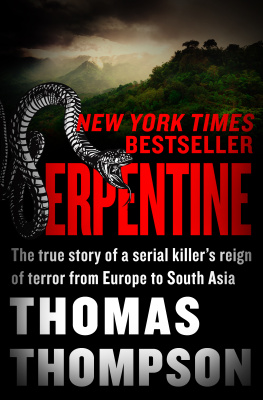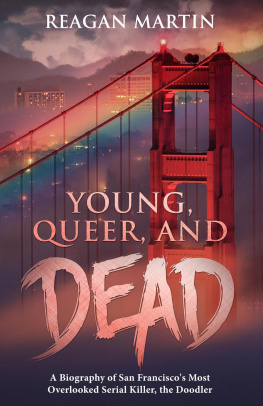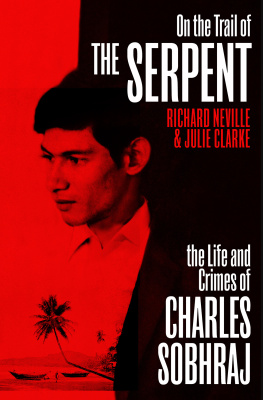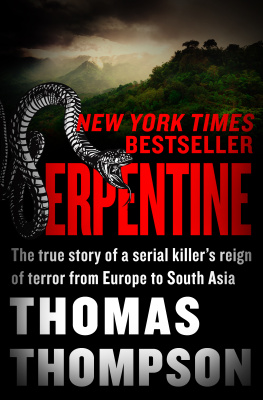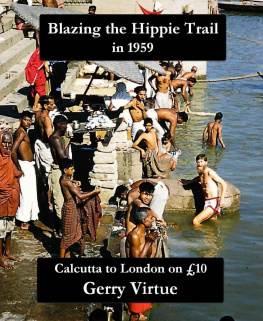Serpentine
Thomas Thompson

Coincidence, if traced far enough back,
becomes inevitable.
Inscription on a Hindu temple near
New Delhi and quoted by Carl Gustav Jung
On a July noon in 1978, Judge Joginder Nath entered his modest courtroom in Old Delhi to make known his long-awaited decision. His chamber was thronged, in a state of agitation, each person present having passed through a gauntlet of soldiers with fixed bayonets on their rifles and a commando squad of police trained in judo. During an hour or two of last-minute suspense, while the judge attended to paper work in his office, the monsoon rains had assaulted the city, the courthouse roof sounding as if the gods were dancing amid a million penny nails. But now, as the judge cleared his throat and requested silence, the torrents stopped, abruptly, as if even the gods wanted to hear the end of the story.
For more than a year Judge Nath had presidedrefereed was perhaps a better wordover a murder trial both tempestuous and bizarre, one that contained enough sex and betrayal and intrigue to fill the darkest scenario. But it was larger than that. Beyond the massive borders of India, blood had spilled over many countries in Southeast Asia, blood attributed by police to the principal defendant.
Over a period of several months in late 1975 and early 1976, tourists had been found slain, their corpses strangled and stabbed and burned and drowned, from the paradisical beaches of Thailand to the awesome slopes of the Himalayas to beside the holy river Ganges. Police of half a dozen Asian nations finally affixed the number of deaths at twelvealthough one Delhi detective suspected the total could doubleand perhaps double again.
The murders were savage, seemingly totally at random. Capricious. Inexplicable. Cruel pranks of fate. The victims, Americans and Europeans, had come to the East on varied personal missions, none knowing that beyond a certain bend in the road was waiting the agent of their deaths.
Would the defendants please rise? asked Judge Nath, peering through thick glasses at the two men and a woman. He seemed troubled, his face worn and melancholy. Perhaps it was because what he was about to say would neatly wrap up one murder, but it contained no answer to the most important question of all. Why? Why did these deaths occur? Why did these lives collide?
PROLOGUE
The threat of still another familial war with Pakistan and a swelling moon the hue of lemon topaz hung in contradiction over the capital of India on this torpid autumn evening in late October 1971. The government of Indira Gandhi had ordered a blackout, but in Delhi the stubs of candles flickered like massed stars, and the embers of street braziers glowed like cats eyes.
The old part of the city was electric with tension and passion. If India had her way, the nuisance of East Pakistan would no longer squat like a malignant tumor on the shoulder of the subcontinent. One quick war, as swift as the slash of a great sword, would sever the squalid Moslem annex and transform East Pakistan into Bangladesh. It would be a new nation, but one as obedient and docile toward India as an adopted pup. Indira Gandhi knew that she had little to fear from Pakistan, but nonetheless she directed her country to gird for war. One hundred miles to the south of Delhi, camouflage netting and bales of straw swaddled the Taj Mahal for the first time in three centuries. But like a veiled woman, her beauty was not concealed, only transformed into an unmistakable silhouette of mottled bronze.
As this night began, another woman was in torment at Delhis Ashoka Hotel, a sprawling pink palace set down in gardens of orchids and bougainvillaea, a structure larger than many Indian villages and built by Nehru with uncharacteristic extravagance. He had ignored the criticism, for he wished to celebrate the new India and provide a house of reception for the world leaders who would come to see what Britain had surrendered.
The woman, who called herself La Passionara, decided to defy the blackout. No degree of international tension could interfere with her toilette on this of all nights. She could not risk making up her face by candlelight. Drawing the heavy drapes, she cursed the thought of war and turned on a soft light. It was time to dance. In rose water and jasmine she bathed, rubbing oil of sandalwood onto her body, seeking to knead away the tightness in her legs and the knots of muscle. For her face, she selected a whitish base and powder, calculating that it would enhance not only her dark eyesenlarged with a half moon of kohl and glistening from a drop of glycerinebut also the crimson silks she wrapped about her slender body. She envisioned how they would float like ethereal clouds, provided the cretinous stagehand (actually the busboy) remembered to switch on the electric fan for the finale. On her arms she heaped antique bracelets of filigreed ivory, and about her neck she placed her one real treasure, a necklace from the Moghul dynasty, of hammered gold, with enameled plaques of the gods in erotic play. It was a gift from an admiring maharaja whose grandmother had worn the piece to kneel in London before Victoria and Albert.
When she was done, La Passionara rose from her dressing table and swirled happily about the room, catching fragments of her reflection in the mirrors and brass lamps. I am beautiful, she reassured herself by custom, because I am a dancer. Like Isadora Duncan, she considered herself torn from the breast of Terpsichore. But when she stopped, and switched off the forbidden lights, and began the long walk down the hotel corridor to an elevator that would drop her one floor to the Club Rouge et Noir, La Passionara was assaulted by crosscurrents, besieged by emotions beyond normal stage fright. Would anyone even come to see her dance with all this stupid talk of war? Would the hotel management permit the spotlight? Even though she had personally begged the vice-president in charge of entertainment, pleading tearfully that one lonely beam of stage light would not summon the warplanes of Pakistan, and even though he had smiled and bowed and promised, she knew that nothing was ever certain in India until it happened. Why were these forces working against her, menacing what could be the turning point of her life? If all went wellshe hardly dared think it, suspecting somehow that karma was teasing herthere would be no more performances for diplomatic wives in embassy auditoriums, no more cultural centers where her fee was a cup of tea and a piece of stale raisin cake, no more hotel managements that booked her into claustrophobic, smoke-shrouded cellars from Ankara to Lahore and then requested, after her first performance, that she make the act morehemming and hawing heremore provocative. I am not a cabaret dancer, I do not take my clothes off, she had always snapped at the Philistines, summoning hauteur. I am an artiste, a student of the Kalakshetra school of dance. I am a museum of classical music and movement. I am keeper of the flame, seeking not to stir mans blood, but his heart, perhaps even his soul.
Now, finally, a decade of frustration might be swept away in a single hour. The portal of opportunity had reared abruptly in her path. She had fought her way past other, less dedicated supplicants to the head of the line. Gulping deep breaths, she stood behind the screen near the cash register, hearing masculine talk in the gloom beyond. Indian men rarely brought their women to night clubs. The night before, in this very spot, she had waited after the performance, perspiration drowning her face, straining to hear if the desultory applause would sustain a second bow. And then the waiter had brought her the silver tray. On it rested a calling card with exquisite engraving. On the front, discreetly, was printed J. Lobo, Director, The Casino at Macao, and, following an arrow to its back, I admire your dancing. Can we discuss a possible engagement at my casino? Perhaps tomorrow night? A

